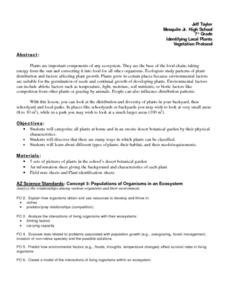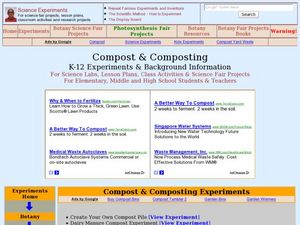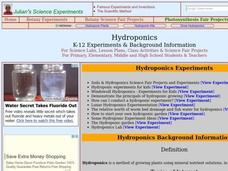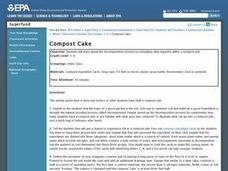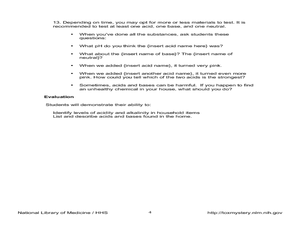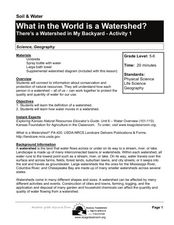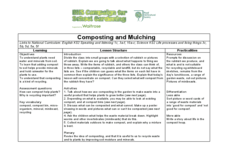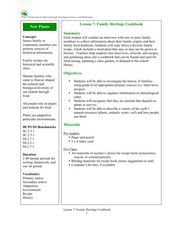Curated OER
Prairie In A Bottle
Second graders observe images of prairie ecosystems and discuss the needs of living things. They create a prairie habitat in a closed jar to observe the water cycle and plant growth.
Curated OER
Red Wigglers
Students are introduced to the benefits of using Red Wiggler worms to produce compost. They identify the requirements for the worms and the methods to follow in order to produce compost. They draw a picture of a functioning worm bin.
Curated OER
U.S. History: Antebellum Heroes and Villains
Eighth graders research and write reports on key figures of the Antebellum Period. The projects also include pictures, bibliographies, and timelines about their assigned figure. In addition, 8th graders present oral reports to classmates.
Curated OER
Peace Corps Challenge Game-National Trees
Students explore trees around the world. In this world geography and tree lesson, students compare familiar local trees and discuss similarities and differences. Students give opinions about why the oak tree was chosen as our...
Curated OER
Planting Rabbit King’s Carrot
Even pirates know not to steal stuff you can make yourself! Read The Pirate's Parrot Stole the King's Carrot to engage your class. Then, plant carrots with your class. If this isn't possible with your kiddos, consider cutting out paper...
Curated OER
Describe Environmental Interrelationships
Students describe environmental interrelationships using list of criteria. They are able to explain organism interaction, based on definitions provided. Also, students can use references and worksheets, to describe effects of pollution...
Curated OER
The Tropical Supermarket
Third graders explore the sources of the various foods they eat. They examine how everyone is intricately connected to the ecosystems in which natural resources are produced. Students observe how the lives of people living in those...
Curated OER
Case of the Missing Pumpkin
Students explore the process of decomposition in plants. In this plant biology activity, students use a cleaned out pumpkin and observe how the decomposition process takes place. Students write down adjectives to describe the pumpkin.
Curated OER
Compost and Composting Experiments
Students investigate the composting process through a variety of experiments. In this ecology lesson, students discuss the benefits of composting. They examine how compost affect plant growth.
Curated OER
Hydroponics
Students examine how to grow plants using a hydroponic system. For this hydroponics lesson students identify the advantages and disadvantages of growing plants hydrologically.
Curated OER
Growing Plants in Science and Literature, More Than an Empty Pot
Students read The Empty Pot as an introduction to plants. In this planting lesson, students understand a sequence of events in the book and relate it to the sequence of a plants life. Students grow plants and record information in flower...
Curated OER
Compost Cake
Young scholars examine the decomposition process. They create their own class compost pile and record their observations. They discover which materials decompose at a different rate.
Curated OER
PLANT LIFE CYCLES
Student learns about the life cycle of plants by watching a time-lapse video. This activity provides students with further evidence that all living things grow and change as they progress through their life cycle. Student conducts a...
Curated OER
Causal Patterns in Ecosystems Section 3
Students design and create a worm and worm free compost tanks for observation of decay in ecosystems. They make predictions, care, and revist tanks using their journals for observation and data collection.
Curated OER
THE PEANUT WIZARD
Students read information about George Washington Carver and outline the information. They are given peanuts in the shell, students examine them and eat them. Students discuss the following questions: Why did George Washington Carver...
Curated OER
Diaper Inquiry
Fifth graders carefully examine and investigate the products contained in a diaper. They particularly analyze the crystal sodium polyacrylate, a product developed for use in astronaut diapers. They follow the scientific method, forming...
Curated OER
Landforms in a Tub
Fifth graders use common household items to build landforms and simulate weathering and erosion.
Curated OER
The Greening of Mars: The Changes Necessary to Sustain Life on Mars
Fifth graders discuss the currents conditions on the planet of Mars. In groups, they work together to develop a mechanism that allows for a balanced ecosystem to survive on the planet. After presenting their ideas to the class, they...
Curated OER
Insects: Bug Off
Students design and conduct an experiment to test three organic pesticides to control ants. They view a video that demonstrates ant behavior and the role of pesticides in insect control. In small groups, they set up behavior...
Curated OER
Diaper Challenge
Young scholars compare the absorbency of a regular diaper and a swim diaper in fresh water and salt water. In this absorbency lesson plan, students mass the diapers and place them in water and determine the change in mass. They do the...
Curated OER
Acid or Base? Toxie's on the Case
Students recognize the difference between acids and bases. In this ToxMystery activity, students play a computer game and experiment to find the difference between acids and bases. Students use litmus paper to determine if...
Curated OER
What in the World Is a Watershed?
Students discover the role of a watershed. In this geography instructional activity, students are shown a diagram of a watershed and discuss the definition of a watershed. Students demonstrate the role of a watershed by using an umbrella...
Curated OER
Composting and Mulching
Second graders define composting and recognize what can be composted. In this composting and mulching lesson, 2nd graders classify objects or pictures as good or bad for composting. Students write a story about life in the compost...
Curated OER
Family Heritage Cookbook
Students compare favorite family recipes. In this cultural diversity lesson, students interview family members and record favorite recipes. Students examine cultural diversity through favorite foods.


